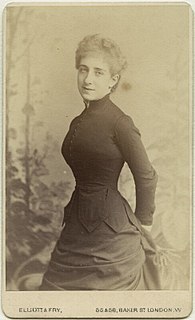A Quote by Jane Austen
I lay it down as a general rule, Harriet, that if a woman doubts as to whether she should accept a man or not, she certainly ought to refuse him.
Related Quotes
Every woman is multifaceted. Every woman has a switch, whether she's going to be maternal, whether she's going to be a man-eater, whether she has to kick ass, whether she has to be one of the boys, whether she has to show the guys that she's just as smart or smarter, she's just as talented or creative. Women suppress a lot of their sides.
A man is commanding - a woman is demanding. A man is forceful - a woman is pushy. A man is uncompromising - a woman is a ball-breaker. A man is a perfectionist - a woman's a pain in the ass. He's assertive - she's aggressive. He strategizes - she manipulates. He shows leadership - she's controlling. He's committed - she's obsessed. He's persevering - she's relentless. He sticks to his guns - she's stubborn. If a man wants to get it right, he's looked up to and respected. If a woman wants to get it right, she's difficult and impossible.
Unless a man is prepared to ask a woman to be his wife, what right has he to claim her exclusive attention? Unless she has been asked to marry him, why would a sensible woman promise any man her exclusive attention? If, when the time has come for a commitment, he is not man enough to ask her to marry him, she should give him no reason to presume that she belongs to him.
The woman is the man's glory, and she naturally delights in the praises which are assurances that she is fulfilling her function; and she gives herself to him who succeeds in convincing her that she, of all others, is best able to discharge it for him. A woman without this kind of "vanity" is a monster.
An interesting example is that the worst woman in the book, who is so cruel and violent, is the sorceress in "The Prince of the Black Islands." She's a beautiful young woman, and she has turned her husband into stone from the waist down. A traveling sultan finds him, in his dreadful state, and the man petrified from the waist down tells his sad story...how his wife comes every afternoon and beats him until the blood runs down. She's just unwontedly, arbitrarily cruel.
Annabel looked down. Her hands were shaking. She couldn't do this. Not yet. She couldn't face the man she'd kissed who happened to be the heir to the man she didn't want to kiss but whos she probably was going to marry. Oh yes, and she could not forget that if she did marry the man she didn't want to kiss, she was likely to provide him with a new heir, thus cutting off the man she did want to kiss.
Sometimes a woman's love of being loved gets the better of her conscience, and though she is agonized at the thought of treating a man cruelly, she encourages him to love her while she doesn't love him at all. Then, when she sees him suffering, her remorse sets in, and she does what she can to repair the wrong.
A woman cannot do the thing she ought, which means whatever perfect thing she can, in life, in art, in science, but she fears to let the perfect action take her part and rest there: she must prove what she can do before she does it, -- prate of woman's rights, of woman's mission, woman's function, till the men (who are prating, too, on their side) cry, A woman's function plainly is... to talk. Poor souls, they are very reasonably vexed!
Every wife ought to answer for her man. If the husband be engaged in a seditious club, or drinks mysterious healths, or be frugal of his candles on a rejoicing night, let her look to him and keep him out of harm's way; or the world will be apt to say, she has a mind to be a widow before her time. She ought, in such cases, to exert the authority of the curtain lecture; and if she finds him of a rebellious disposition, to tame him, as they do birds of prey, by dinning him in the ears all night long.






































